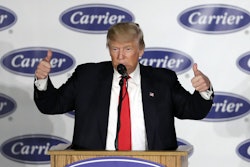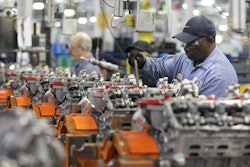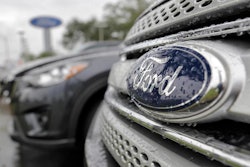TONIGH-00
1,000 Carrier Jobs Staying in Indianapolis; Trump Kicks Off His Thank You
Tour; Wisconsin Recount Underway, with Support from Hillary Clinton
Campaign - Part 4>
Shelby Holiday; John Roberts; David Paul Kuhn>
Wisconsin; Business; Manufacturing>
SHELBY HOLIDAY, WALL STREET JOURNAL: I think you're absolutely right. I'm just not sure this is the time to air those grievances. This was an incredible victory lap. This is a thank you tour. He is thanking people who voted for him. I'm not sure he is reaching out to people who didn't vote for him at this point.
It was tremendously entertaining. We are sitting here in the studio. I have to admit we giggled a few times. Especially when he announced Mad Dog Mattis as his defense secretary. The guy knows how to put on a show.
But we noticed he deviates from the prompter. When he was on prompter it was a very disciplined message and very uplifting unified message. When he went off prompter and attacked political opponents, not just Hillary Clinton, but Republicans that he ran against.
CARLSON: John Kasich, the governor of Ohio by name.
HOLIDAY: John Kasich, Evan McMullen, people who are supposed to be on his side right now. He went after all kinds -- I actually have a list. He asked about the American flag and whether or not people should be punished. When he does those kinds of things, I think it's a little bit risky because right now economic confidence is at a nine-year high. People are feeling optimistic not just about current conditions but about the future.
CARLSON: Right.
HOLIDAY: The market just set 8 records in November. People are actually feeling pretty good about this two weeks later. Whether or not you liked Donald Trump or not, at least economically you are feeling pretty good. He risks furthering those divisions that are kind of automatically healing themselves.
CARLSON: Yes. He may have reached a point of no return with the press. Where he decided there is no way to win the political status with the "New York Times."
It was truly satisfying to me, John Roberts, who has not run for president unlike John Edwards joins us now from the scene in Cincinnati -- John.
JOHN ROBERTS, FOX NEWS: Good evening to you, Tucker. You know, at the very beginning of this you were mentioning about Christmas and how people were going to have a better Christmas and a lot of people here dressed like Santa Claus. This speech was more like festivous (ph), though, because it began with divisional airing of grievances by Donald Trump.
Lingering against the media and so many nay sayers. I got the sense that the speech was a combination of aspirational, inspirational, and in your face. I mean, he was imploring people to help write the next chapter of America saying we don't know what the book will read but we do know that each one of the pages will be authored by each and every one of you.
And at the same time, he turned around and he slammed John Kasich for not being, quote, "in the upper echelon of politicians." He ridiculed the people who said he had no path to 270. He ridiculed the people on election night on television who were saying Hillary Clinton has got this whole thing wrapped up.
You talk, Tucker, about a candidate and now president-elect having fun? He was all about these rallies. This is what he loved to do during the election campaign. Remember when his campaign kind of tried to put some reins and a bridle on him and he chafed against that. He has always loved a big rally and he got one tonight in Cincinnati.
He kind of lamented the new position of president, the security that comes with it at the beginning of his speech because the Secret Service had the bridges and roads were for blocks around the arena here blocked off so people couldn't get inside.
Trump said I'm going to have to talk to the secret service about some new kind of arrangement. It just shows how things do change in some ways when you become the president-elect but in a lot of ways, Tucker. Nothing changes from the campaign.
CARLSON: Well, I have noticed that. I mean, this is a small thing but for those of us who have been a lot in Trump rallies, they are playing the same set lists. You can't always get what you want, which by the way happens now he chose himself.
CARLSON: Yes, each and every one of them when he added in the Back Street Boys probably about the beginning of October, it was a welcome diversification from the Rolling Stones.
ROBERTS: I felt it was troubling but we disagree.
CARLSON: Now I think I have been ruined on the Rolling Stones for the rest of my life, Tucker.
ROBERTS: Amazing. Same thing happened with big and rich in 2000.
CARLSON: John Roberts at the scene. Really a more significant event. Thanks a lot for that. I appreciate it.
So here's what I noticed among the many other things was the intellectual underpinnings of the speech he went after identity politics pretty explicitly. Making the counter case against him which he is a divider and his point was in effect the politics of our modern era divides people by its nature.
He went after globalism in a really specific way he said in a pretty nice summation, an eloquent one. He said, "People's deepest loyalty is not to a global community, but to their local community." I think that's a compelling message because it comports with what people really want.
BURNS: Yes. What's interesting is that, you know, these are a lot of the things he did talk about on the campaign trail.
CARLSON: Yes.
BURNS: When we talk about we can't believe he said this or doing this, is he talking about the same kinds of things he was on the campaign trail. We also have to remember that Donald Trump is really kind of a third party candidate.
He is not traditionally a Republican. We saw that with the Carrier announcement today as an example and some of the proposals he talked in this speech and he certainly not a Democrat.
He has run as one who is not beholden to either of these parties and can go outside the mainstream in that way. I don't anticipate that changing at all when he is the president.
CARLSON: Shelby, you worked at the "Wall Street Journal," which is on its editorial side anyway traditionally kind of the mouth piece for a certain sort of Republican orthodoxy. Since Teddy Roosevelt, has there ever been a Republican to look at big business and saying I'm grabbing you by the shirt collar and forcing to do this or that? I've never heard that.
HOLIDAY: We're hearing it for the first time in very long time and also hearing it an extremely unique way. A lot of people were a little troubled by Carrier because if you put a company under fire these companies start realizing we're going to threaten to send jobs overseas and you are going to give us something in return for us not to do that.
I mean, I'm not sure -- we still don't know the exact terms we learn more about it today. He is really focusing on businesses and a lot of business leaders are very encouraged that they have a president they could call up on the phone. He will listen to them. He will talk with them and engage with them. What do you need right now? So business leaders are reacting very positively.
CARLSON: The basic Republican orthodoxy on economics is essentially libertarian. The government shouldn't interfere in markets. Markets are the most important thing.
HOLIDAY: Republicans are usually pro-free trade.
CARLSON: That's not at all what he is saying. He is not saying governments should not interfere in markets. He is saying that markets are not the point. Social stability is the point.
BURNS: Right. But again, I mean, look at his numbers in this election. I mean, a lot of the people that he attracted were not these traditional conservative Republicans.
CARLSON: Yes.
BURNS: You talk to a lot of these people and Carrier is a good example of that today. Yes, it deviates from Republican orthodoxy or conservative principles, but he's actually, they say, delivering on an election promise, which is also a deviation from how politicians tend to operate.
So I think the Carrier decision, while it is opened and should be open to critiques and the precedent that it potentially sets, I think it was an important symbol for him to start out his term saying, look, I did this for you. I said I was going to do it and he delivered. People just want something done.
CARLSON: That's for sure.
BURNS: That's a very good point.
CARLSON: If the left hates me so much and thinks so little of him and dismisses him out of hand as a bigot or whatever, I'm wondering if anybody listened to that speech. I mean, I'm sure the critique on the other channel saying he's a demagogue and he went off script, et cetera.
I mean, if you actually look at the speech, there's all kinds of interesting stuff in there. There was an actual critique of modern American society that is not and especially right wing critique that I can tell.
HOLIDAY: It was fascinating and for the first half of it he was on prompter and on message. It was very disciplined, very uplifting. People really listened to it and thought wow, our jobs are going to get better. Our wages might go up. Businesses are going to be feeling good about this.
But then when he went off prompter, you know, you could tell he was kind in and out of the speech. He does so well in front of these crowds. He thrives on it. He reads them. He asked for feedbacks, but it took away from the brilliant underlying message that he was delivering.
CARLSON: Well, it wasn't sort of a (inaudible). There is a little bit of everything, but if somebody reads a lot of prompter, pretty hard to reading prompter to sort of free styling out there. And he did it pretty -- he's good at it. Thank you both for joining us. I appreciate it.
We got a preview, Sean Hannity interviewed the president-elect and we want to throw to a cut from that. The whole thing will be on at 10 tonight. Trump sat down for an interview in Cincinnati with our own Sean Hannity and we want to play a little bit of what transpired in that. Watch.
(BEGIN VIDEO CLIP)
TRUMP: I'm down to probably three or four.
SEAN HANNITY, FOX NEWS HOST: Are they from your list?
TRUMP: From the list. They're terrific people, highly respected, brilliant people and we'll be announcing that pretty soon too. We're going to be rescinding executive orders, but I don't think we're going to have to use very many executive orders because we have a Congress that's going to go along with things and I think a lot of Democrats are going to join the train if you want to know the truth.
HANNITY: Have you talked to any?
TRUMP: Yes, I have. A lot of people said he's never been in politics. I've been very active mostly from the other side. But we're going to have a lot of Democrats joining us on a lot of these things, maybe even health care. But so many of the things we're going to be pushing are common sense and we'll get a lot of support. And I think that's going to start happening very soon.
(END VIDEO CLIP)
CARLSON: Trump is talking about Supreme Court picks. You can watch the entire thing, but Sean's interview with Vice President-elect Mike Pence and incoming chief of staff, Reince Priebus, former head of the RNC, all on his show at 10:00 p.m. Eastern tonight.
President-elect Trump picked up a remarkable support from white working class Americans. We've heard a lot about that on his way to the White House. During his "Thank You" tour, he'll visit many of the same communities that supported him. How big was his win in that demographic?
Joining us now is political analyst, David Paul Kuhn. He is one of the experts on demographics in covering American politics. Great to see you. How big and how unprecedented was his win among this newly famous demographic, working class?
DAVID PAUL KUHN, POLITICAL ANALYST: So Donald Trump did better with working class whites than any Republican since Ronald Reagan in 1984, which is stunning, first of all, because of course, Reagan was incumbent and he would had the political wind in his back.
Hillary Clinton also did worst with working class whites than any Democrat or Republican since the World War II. On top of all that, Trump did best with the blue collar white men than any Republican or Democrat since the Second World War.
So what does that all mean? He had historic mandates from the white working class from the very voters he spoke to tonight and the very voters he's been -- who made his presidency.
CARLSON: It sure seems that way. So the question is why. Here's my theory is two-fold. One, he doesn't hate them, unlike the left, which actually (inaudible). And two, he's abandoned the stumbling block they had to join the Republican Party, which was their economic program. They didn't like the Republican economic program actually and the Republican leaders didn't know that.
KUHN: Absolutely. I mean, first of all, the party of hyper capitalism, the traditional Republican Party, didn't notice that the majority of their voters were victims of capitalism, number one.
Number two, listen, he came off Lee Greenwood tonight. First of all, that speaks the symbolism of the office and that speaks directly to them. So the presidency is as much about the symbolism as it is politics.
When he starts speaking this pride, alluding to the icons of Middle America like coming out to Lee Greenwood, very Reaganesque, I think that speaks to something far deeper than policy. Obviously -- well, not obviously, but the 2016 election reminded us that presidencies are made in the gut, not the head. And I think Trump also speaks to their gut directly.
CARLSON: Well, of course, he does. He's a genius at that, but he is also making a deeper pitch, which is against the hyper capitalism that you mentioned. He's not against capitalism, he's a beneficiary of capitalism and a promoter of it.
But the idea that we are helpless before economic change, there is nothing we can do, which is Obama's position, Hillary's position, I'm sorry it's over for you, we're going to retrain you or whatever. He doesn't buy that.
KUHN: Yes, so let's say the Carrier news. That anecdote is exactly what Barack Obama didn't do in 2009. Now obviously this is symbolic except for (inaudible). But what's important about that is he went beyond the market forces. He went beyond the norms and said I'm going to use what power I have in the bully pulpit to save those jobs.
He hadn't done that and the jobs went to Mexico, he would have been destroyed in the press today. The fact that he did that speaks to exactly what populous on the left and right wanted to see from Barack Obama during the great recession.
They wanted to see a president who said regulations be damned, norms be damned, I'm going to make the great recession, the economy, the blue collar crisis, mostly job loss.
CARLSON: Yes, that's right.
KUHN: I'm going to make that my alpha and my omega. That's what my presidency will be about.
CARLSON: Which would have been a traditional Democratic tradition.
KUHN: Which would have meant Donald Trump wouldn't have won the presidency. But of course, Barack Obama didn't do that and --
CARLSON: Why? Because they're beholden to the market fundamentalists in the tech world among other who don't believe in that at all.
KUHN: I also think because which you alluded to they see the working white class, the very people traumatized by the great recession as an opposition to sort of the next America. I will also say there was tension, there were e-mails in back rooms about, you know, we don't want to give jobs to burly men during the 2009 --
CARLSON: And by the way, if people think you hate them, they don't like you.
KUHN: Or if you just leave them out. Hillary Clinton didn't speak about the white working class, she just left them out of the conversation.
CARLSON: She called them privileged. There was an amazing exchange today and I don't think it's been on television yet at the Kennedy School. Jennifer Palmieri, who was the communications head over on the Hillary campaign and Kellyanne Conway, of course, the campaign manager for Trump, got into this debate.
And Jen Palmieri basically said you won because of white racism. My read on is that they believe that. That's the explanation for the election results. Do you think they believe it?
KUHN: I think they believe it. I also think it disservices the Democrats the most. Because obviously when you call someone a racist or a sexist, you're saying their point of view doesn't matter. You're invalidating every concern they have.
The irony of that is so palpable because the Democratic Party is so sensitive to this, the opposite dynamic occurs. If a conservative was to say that about a woman, that you're being emotional, that's obviously inappropriate. You could see what triggered the anger and you don't see --
CARLSON: The root causes we used to call them.
KUHN: You don't see the Democratic Party extend the same tolerance and sympathy to the very voters who once were the keystone of the Democratic coalition.
CARLSON: Is there anyone on the Democratic side, any smart person who's thinking about this clearly and trying to really understand what just happened to their party?
KUHN: Well, there's obviously people on the outs with the Democratic Party, like Jim Webb who clearly was an icon of sort of the Reagan Democrat and I think how he came to be thrown under the bus with the contemporary Democratic Party really does capture the problem Democrats have with some of the very voters that they should most speak to if they actually say what they mean --
CARLSON: Agree with that completely. One of the smartest people I've ever interviewed, Jim Webb. Thank you, David. It was great.
KUHN: Thanks for having me.
CARLSON: TUCKER CARLSON TONIGHT, each weeknight at 7:00 Eastern. Thanks a lot for watching. Here's Megyn Kelly. Good night.
END
(Copy: Content and Programming Copyright 2016 Fox News Network, LLC. ALL RIGHTS RESERVED. Copyright 2016 CQ-Roll Call, Inc. All materials herein are protected by United States copyright law and may not be reproduced, distributed, transmitted, displayed, published or broadcast without the prior written permission of CQ-Roll Call. You may not alter or remove any trademark, copyright or other notice from copies of the content.)






















